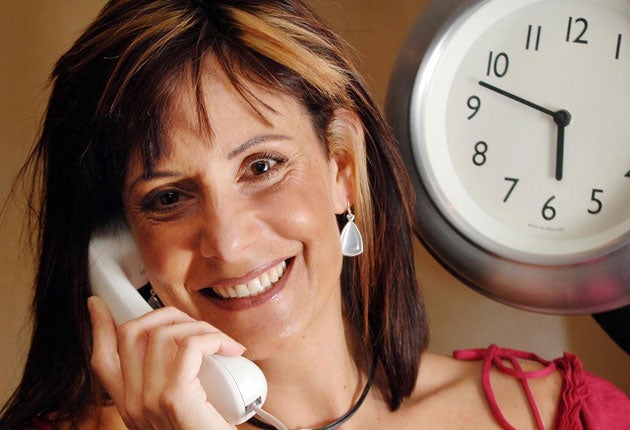At the third stroke, the speaking clock will be 75 years old

Your support helps us to tell the story
From reproductive rights to climate change to Big Tech, The Independent is on the ground when the story is developing. Whether it's investigating the financials of Elon Musk's pro-Trump PAC or producing our latest documentary, 'The A Word', which shines a light on the American women fighting for reproductive rights, we know how important it is to parse out the facts from the messaging.
At such a critical moment in US history, we need reporters on the ground. Your donation allows us to keep sending journalists to speak to both sides of the story.
The Independent is trusted by Americans across the entire political spectrum. And unlike many other quality news outlets, we choose not to lock Americans out of our reporting and analysis with paywalls. We believe quality journalism should be available to everyone, paid for by those who can afford it.
Your support makes all the difference.As the pips go on its 75th anniversary this weekend, the "speaking clock" still registers 30 million calls each year, generating nearly £10m in revenue for British Telecom.
At its peak, the service received around 230 million calls a year. Designed at the Post Office Engineering Research Station to assist people without watches and first made available on 24 July 1936, the original announcements were automatically co-ordinated on the hour with Greenwich Mean Time signals.
There have only been four permanent "voices" in the clock's history. The first, Jane Cain, was the winner of a Post Office "Golden Voice" competition, and used from 1936 until 1963.
Pat Simmons, a London telephone exchange supervisor, became the second voice from 1963 until 1985. Actor Brian Cobby, the voice of "5-4-3-2-1 Thunderbirds are go!" in the Gerry Anderson television series, became the first male voice at 11am on 2 April 1985.
The current voice, Sara Mendes da Costa, a voiceover artist from Brighton, made her debut in 2007 after beating 18,500 rivals in a BT competition. Ms da Costa said: "The speaking clock was the first call I was allowed to make as a child – it was free then. I think people who have grown up with it will continue to use it."
It took Ms da Costa three takes of 45 minutes each to record the 80 different announcements she had to make. She hopes her voice will last as long as Jane Cain's 27-year stint.
But she can see a time when the clock could have a regional dialect or an ethnic minority accent to reflect the diversity of modern Britain. "The judges did consider a whole range of dialects," said Ms da Costa, "like a Scottish lilt but the conclusion seemed to be that a received pronunciation voice was the most accessible to listeners. That could change in the future."
The secret of its longevity remains its precision. It is accurate to within five thousandths of a second and is used by Big Ben to check its own accuracy.
A BT spokesman said: "We see a surge on New Year's Eve, when GMT moves to BST and on Remembrance Day. We have no immediate plans to change the voice. We do occasionally add temporary voices for charity – such as Gary Barlow and Cheryl Cole, who both have regional accents and Lenny Henry has also been the voice." Callers will hear a special 75th birthday message when they call 123 on Sunday.
Join our commenting forum
Join thought-provoking conversations, follow other Independent readers and see their replies
Comments